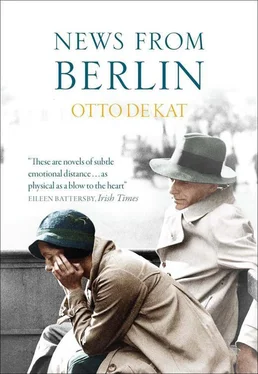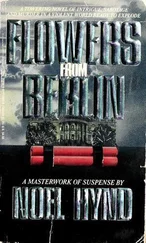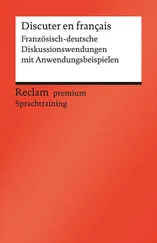The dog carried on barking, growling, yelping, running and jumping up against an invisible fence alarmingly close by. Wapenaar’s wife went over and called the animal by its name, softly and commandingly, then put her hand through the hedge to pat it. Order was restored, quiet reigned once more.
“She’s a nice enough creature, but she’s left alone for far too long.”
Emma nodded understandingly. Alone for far too long, that was something she was finding increasingly difficult to cope with. Carl going off to work, leaving her sitting at home facing a lonely, empty day ahead of her and having to find things to keep her busy until he came home in the evening. Days during which she banished the war to the back of her mind and worked in her garden, weeding and pruning. The pretence of normality was a way of dealing with a hostile environment, something she saw women everywhere attempting to do, acting as if nothing was wrong, as if they were leading their ordinary lives. Was it not ever thus for wives, whose husbands were always working, as soldiers, bakers, professors, civil servants, ministers?
Emma eyed the friendly woman over the glasses of orange juice on the table between them. There was an idyllic-seeming quality to the setting, which she was loath to disturb. The woman asked Emma to call her Elka, a nickname, really, dating from her childhood, when her father used to write little notes to her always beginning with a capital L and a capital K , for Liebes Kind . And so she became Elka. Emma listened, thinking that she could not remember her father ever writing little notes to her. Her father, whom she missed so achingly now, and who seemed to be drifting further and further away from her.
Since her parents moved away from Berlin she had not been back to Fasanenstrasse, where she and Carl had first met, where her unmoored existence had begun. Her courage at the outset, like her nostalgia for what she had to leave behind, had been boundless. She and Carl swam upstream, never tiring or losing hope, never afraid. After her parents’ farewell dinner she had watched him as he walked away, and he had turned round and seen her, and had waved in surprise because she was waving too. That cheerful, hopeful hand still waved at her each day from the garden gate. Carl was the complete opposite of her father, as transparent as glass, a miracle of straightforwardness.
Through the open windows reverberated the chimes of a clock striking the hour. Emma counted twelve – she had been there for an hour already, she must leave. She apologised for staying so long, saying she would come back another day, if that was alright. A whole hour! She cringed with embarrassment. She had hardly said a word while Elka Wapenaar entertained her, squeezed oranges for her, rocked her to sleep, so it seemed.
She headed back to Dahlem, cycling on automatic pilot as she thought of her father. And for the umpteenth time of the remark about her mother. The glint in her interrogator’s eyes had been malicious, his tone insinuating. Quite a looker, know what I mean. Do you get what I’m saying. Suddenly it dawned on her. Clamping the brakes hard, she heard the tyres skid over the road. Her father had another woman.
She stopped, parked her bicycle in the verge and cast around for a bench to sit on. Her inclination was to weep, but the tears did not come. Her face was hot, her hands were cold. Quite a looker. Her thoughtless, faithless father had been seen in the company of a woman, and not just any woman. They had been followed, and even from a distance her appearance had been striking, or rather, her father had obviously found her striking. That had to be it: the mystery of his evasiveness in Geneva explained. He had been half out of his mind when he joined her and Carl, his eyes more than once shifting away from hers. Emma looked about her: it was busier now on Königsallee, with people on foot and on bicycles passing by. To her surprise, it was not plain anger that she felt, rather an old sadness. It had to do with something she had been hiding for years. That she did not really know her father. Her love for him was so naive and unconditional. As love should be. Her father, who belonged with her mother, who would never leave her, never ever, not for anybody, not even for the love of his life, or whatever she was. Suddenly she was seized with rage. Rage over what he was putting in the balance, over his bit on the side, over his secrecy and his deceitfulness and his refusal to meet her gaze.
She picked up her bike and wheeled it to the side of the road, hardly aware of where she was going, unable to stem the flood of memories.
She saw him enter the restaurant where he was meeting her and Carl. Her boyish papa. She had gone up to him as quickly as decorum permitted, she had thrown her arms about him, had taken his hand and drawn him to their table, where Carl was waiting. It had been more than a year since she had seen him, a radically altered world ago, countless bombing raids and massacres ago, though nothing of that was mentioned. It was too much, too overwhelming, too huge to grasp. She had watched him and seen the shadows passing across his face, the way he sidetracked her as soon as she asked him a personal question, the way he seemed not to want her to get too close. He probably hadn’t even wanted to be there at all, she could see that now. He had been at pains to avoid every form of intimacy. Had he taken against her marriage with Carl? No, that was unlikely, as she could tell he regarded Carl as a friend. He had even spent more time talking to him than to her.
“The last time we were together, you, me and Mama, was up here in the mountains, wasn’t it?” His discomfort had become almost palpable when she said that. He responded by asking her about Berlin, steering the conversation away from himself yet again. Her feelings had been hurt, she had so looked forward to this, longing to see him, hear him, relish the known gestures, be close.
Another woman, for God’s sake, Papa. Her rage flared up again, at him, and at the Gestapo for exposing him. What were they after, why would they be so interested in him? Her father, with a lock on his mouth and a lid on his soul. What else had he been up to all these years?
From nearby came the sound of those wretched tennis balls; playing tennis now was a criminal pastime, a cruel joke. She would leave Carl out of it, much as she ached to confide in him. In some ways she resembled her father, she realised. She would keep this to herself.
“Looking for someone?” A man on a bicycle slowed down, stopped, and looked her up and down. She shook her head and prepared to move on.
“Your papers, please.” The condescending tone of an informer, or at any rate of a party member sporting a fancy badge. He probably lived somewhere nearby. But this was beyond the pale. Emma struggled to keep her voice under control.
“Yes indeed, I do have papers. But I am not going to show them to you. And if you don’t leave me alone immediately I shall file a complaint at my husband’s department.”
Her voice rose as her anger mounted. It was an impulsive, irrational outburst, but no less effective for that. The man stiffened, mumbled an apology and sped away on his bicycle.
Emma lapsed into nervous laughter as she stood there in a world gone insane, where people demanded to see each other’s papers.
Kate took the bus to Richmond Hospital in the morning as usual, to return in the afternoon. The Richmond was a repository of the sick and wounded from ever farther corners of the earth, a round-the-clock enterprise. She liked her job. The patients followed one another in rapid succession, and she had a knack for putting people at ease and seeing to their wants and needs with discretion. “Head of subtle affairs”, one of the doctors called her, a man who reminded her vaguely of Peter Henning, the surgeon she had worked with for over a year in Berlin, at a time when murder and manslaughter were already the order of the day. He had fallen in love with her, she not with him, but it had lightened the atmosphere in and around the operating theatre. Oscar was unaware of this, and there was no reason to worry him unduly. That was all of five years ago.
Читать дальше












